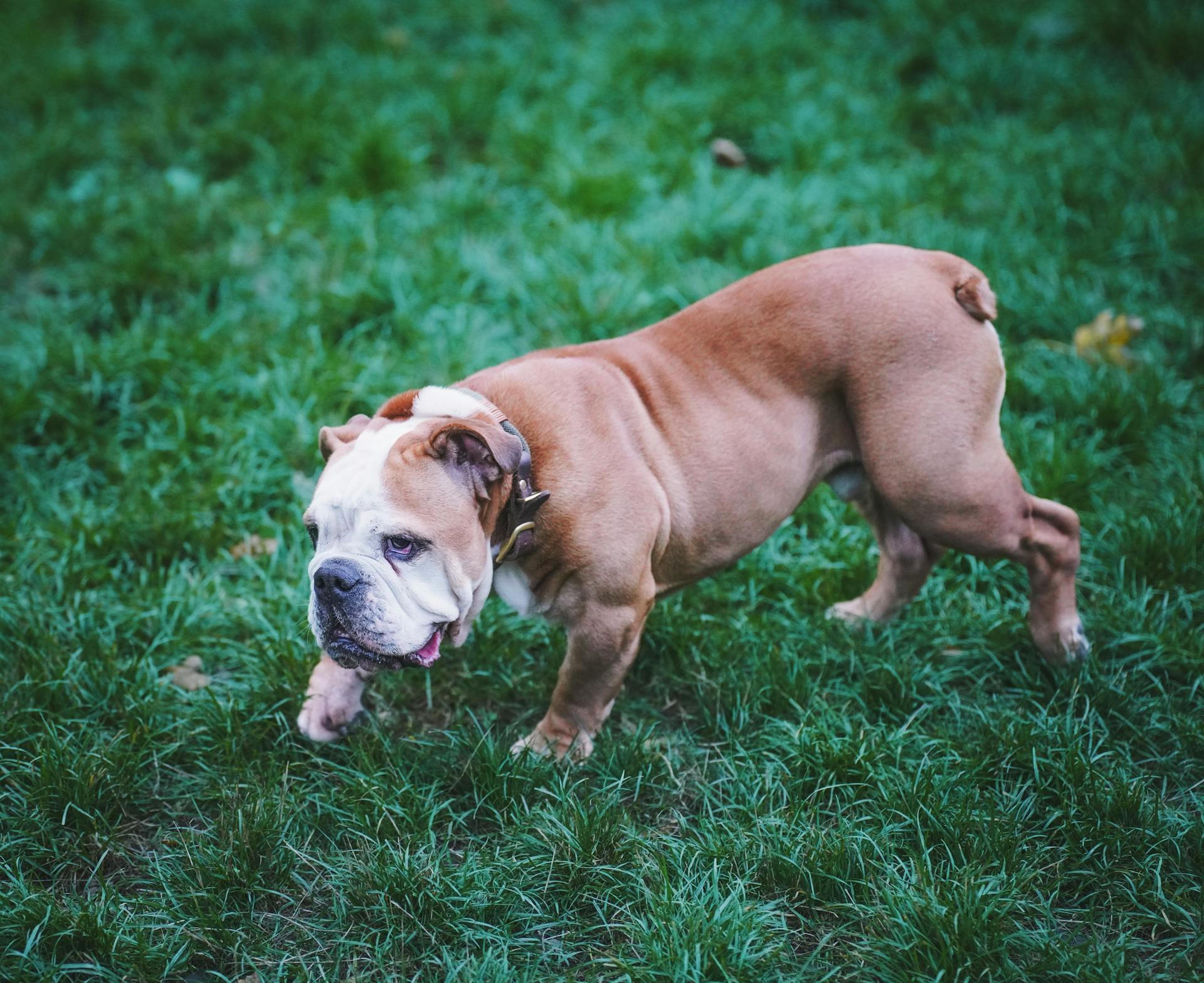
English Bulldogs are prone to skin allergies due to their unique skin folds and facial wrinkles, which can trap dirt, dust, and allergens.
Bathing your English Bulldog regularly can help reduce skin irritation and allergies. A gentle, fragrance-free shampoo specifically formulated for dogs can be used 2-3 times a week.
Oatmeal baths are a popular home remedy for skin allergies in English Bulldogs, as they have anti-inflammatory properties that can soothe itchy skin. Oatmeal can be added to your dog's bath water or used as a paste applied directly to the skin.
A diet rich in omega-3 fatty acids can help reduce inflammation and promote healthy skin in English Bulldogs. You can add fish oil supplements to their food or feed them fatty fish like salmon or sardines.
English Bulldog Skin Allergies
English bulldogs are prone to allergies, and one of the most common symptoms is itchy skin. This can be caused by a variety of factors, including food allergies, environmental allergies, and flea allergies.
Allergies in English bulldogs can lead to a wide range of skin issues, including inflammation, excessive itching, redness, hair loss, and sores.
If your bulldog has itchy skin, it's essential to identify the underlying cause and take steps to alleviate the symptoms. Regular grooming can help reduce environmental allergens, while frequent baths can wash away potential irritants.
Some common signs of allergies in English bulldogs include skin irritation, excessive scratching, and red and inflamed skin. Respiratory symptoms such as sneezing, coughing, and wheezing can also occur.
Food allergies can lead to gastrointestinal symptoms in English bulldogs, including vomiting, diarrhea, and a poor appetite.
To help prevent allergies in your bulldog, it's crucial to maintain a clean living space, use flea treatments regularly, and monitor your dog's environment for signs of flea infestations.
Here are some common allergens that can trigger allergies in English bulldogs:
• Grains such as wheat, corn, and soy
• Poultry, particularly chicken
• Pollen, dust, and other environmental allergens
If you suspect that your bulldog has an allergy, it's essential to consult with a veterinarian to determine the best course of treatment. They may recommend medication, dietary changes, or other treatments to help alleviate the symptoms.
Readers also liked: Home Remedies for Dogs with Flea Allergies
Here are some common medications used to treat allergies in English bulldogs:
• Antihistamines
• Corticosteroids
• Topical treatments, such as creams or ointments
• Cytopoint, an injectable therapy that targets the itching caused by allergies
Remember, every dog is different, and what works for one bulldog may not work for another. Always follow the treatment plan recommended by your veterinarian and monitor your dog's response to any new medications or treatments.
For your interest: Dog Hives Allergic Reaction Staffy Skin Bumps
Home Remedies
You can try an oatmeal bath to soothe your bulldog's irritated skin. Oatmeal has soothing properties that can reduce skin inflammation and itching.
Regular bathing with a hypoallergenic shampoo can help wash away allergens like pollen or dust and calm the skin. Choose a shampoo free from chemicals and artificial fragrances.
Applying coconut oil to areas of your bulldog's skin can help treat itchy or infected areas. It acts as an antibacterial and antifungal agent, making it a safe and effective remedy.
On a similar theme: Oatmeal Bath for Dogs with Allergies
Using an air purifier can help reduce your bulldog's exposure to airborne allergens indoors. Regularly washing their blankets, beds, and toys with hypoallergenic detergents can also reduce allergen build-up.
Adding apple cider vinegar to your dog's bath or diluting it with water can help treat itchy skin. However, be sure to use it in small quantities and avoid ingesting large amounts, as it can upset your dog's stomach.
Natural Remedies
You can make your own saline rinse by mixing 1/8 teaspoon of table salt with distilled water, making it a cost-effective and convenient option.
Oatmeal baths are a popular home remedy for skin allergies in bulldogs. Oatmeal has soothing properties that can reduce skin inflammation and itching.
Regularly bathing your bulldog in an oatmeal-based shampoo can help wash away allergens like pollen or dust and calm the skin. Choose hypoallergenic shampoos free from chemicals and artificial fragrances.
Coconut oil can be applied to areas of your bulldog's skin that are irritated or inflamed. It acts as an antibacterial and antifungal agent, making it perfect for treating itchy or infected areas.
Probiotics and other dietary supplements can support your bulldog's immune system and improve their overall health. A healthy gut can make a significant difference in your dog's ability to fight off allergens.
Apple cider vinegar can be used to treat itchy skin, but make sure to dilute it with water and use it as a spray on problem areas. Too much vinegar can upset your dog's stomach.
Regularly washing your bulldog's bedding, blankets, and toys with hypoallergenic detergents can reduce allergen build-up.
Dietary Changes
Dietary changes can make a big difference in managing your dog's allergies.
Apple cider vinegar has been observed to have intrinsic antimicrobial properties, which can help soothe itchy skin. However, it should only be used if there are no open wounds, as it can cause stinging.
Studies have suggested that alterations in your dog's diet can help improve their condition and protect against pruritus. Polyphenols, found in fruits and vegetables, have anti-neoplastic and anti-inflammatory properties.

Dietary changes can also help decrease allergic immune responses through allergen sensitization and allergen re-exposure. Certain polyphenols have been found to interfere with antigen-presenting dendritic function/maturation and render antigen proteins hypoallergenic.
Some of the most common ingredients that can trigger allergies in bulldogs are grains such as wheat, corn, and soy, which often manifest as skin irritations, itching, and gastrointestinal issues.
Choosing the right diet for your bulldog is crucial in managing their allergies. A diet high in polyphenols, antioxidants, and polyunsaturated fatty acids has been found to improve atopic dermatitis in dogs.
It's worth noting that identifying the specific ingredients and foods that are allergy triggers can be real detective work, requiring an elimination diet where new ingredients are introduced one at a time and watched for reactions.
Consulting with your veterinarian is the best way to determine the right diet for your bulldog and create a plan to address their allergies effectively.
You might enjoy: English Bulldog Diet
Common Issues
English bulldog skin allergies can be a real challenge to deal with. Itchy skin is a common issue, causing inflammation, excessive itching, redness, hair loss, and sores.
Excessive pawing, licking, and scratching are signs of skin irritation, which can be a symptom of allergies. If you notice any wounds or sores, it's essential to take your dog to the vet as soon as possible.
Skin irritation can be caused by environmental allergens like strong bathing products, dust, and pollen. English bulldogs are prone to breathing difficulties due to allergies to pollen or dust, which can lead to sneezing, coughing, and wheezing.
Food allergies can cause gastrointestinal symptoms, including vomiting, diarrhea, and a poor appetite. If your dog experiences excessive gas passing, it could be a sign of a food allergy.
Excessive licking of the paws is often related to allergies or contact-related irritants. Epsom salt soaks can help wash off environmental allergens and soothe the skin of the feet, promoting healing.
If this caught your attention, see: How Much Food Should a 50 Lb English Bulldog Eat
Medical Conditions
English bulldogs can be prone to skin allergies due to their unique skin folds and facial structure, which can trap dirt, debris, and allergens.
Their skin folds can also make them more susceptible to infections, which can exacerbate skin allergies.
Common skin allergies in English bulldogs include atopic dermatitis, contact dermatitis, and food allergies.
These allergies can cause symptoms such as itching, redness, and inflammation on the skin.
You might enjoy: French Bulldogs and Allergies
Mange
Mange is a parasitic skin condition caused by mites, specifically the Demodex canis mite, which burrows into the skin of dogs, causing intense itching and skin irritation.
The Demodex canis mite is a common parasite found in the skin of healthy dogs, but it can become problematic when it overpopulates and causes mange.
Dogs with mange often exhibit symptoms such as hair loss, redness, and crusting on the skin, particularly on the face, ears, and legs.
Mange can be treated with topical medications, such as creams and shampoos, or oral medications, such as ivermectin.
Ringworm
Ringworm is a fungal infection that can affect various parts of the body, including the scalp, face, and body. It's highly contagious and can be spread through skin-to-skin contact with an infected person or by touching contaminated animals or objects.
Ringworm typically presents as a ring-shaped rash with clear skin in the center, surrounded by red, itchy, and scaly skin. The rash can be painful and may cause hair loss in severe cases.
Ringworm can be treated with topical antifungal creams or ointments, and oral medications may be prescribed for more severe cases. It's essential to complete the full treatment course to prevent the infection from coming back.
Ringworm can be prevented by practicing good hygiene, avoiding close contact with infected individuals, and washing clothing and bedding regularly.
Treatment Options
Medications can be a real game-changer in treating allergy symptoms in English Bulldogs.
Antihistamines are commonly used to treat mild allergy symptoms, such as sneezing or itchiness, and can be effective in cases of environmental allergies like pollen or dust.
Regular grooming is essential for reducing environmental allergens, and brushing your bulldog's coat removes loose fur and dander.
Flea prevention is crucial for bulldogs, as flea bites can cause severe allergic reactions, and using flea treatments regularly can help.
A healthy diet free from allergens is essential for managing food allergies, and opting for high-quality dog food without common allergens like chicken, beef, or grains can help.
Here are some medications that can help manage allergies and asthma:
- Antihistamines such as Benadryl, Claritin, Allegra, and Clarinex OTC that can help relieve itching, sneezing, and runny nose.
- Nasal corticosteroids such as Flonase (now available over the counter) or Nasonex may reduce inflammation and control symptoms.
- Cromolyn sodium is an OTC nasal spray that may help reduce symptoms, especially if it’s used before they develop.
- Decongestants make it easier to breathe by shrinking swollen tissues in the nasal passage.
- Leukotriene modifiers are prescription medications that may be recommended if other treatments aren't effective.
Your veterinarian may also recommend topical treatments, such as creams or ointments, to apply directly to the skin, or injectable therapies like cytopoint to target the itching caused by allergies.
Preventing Health Issues in Bulldogs
Preventing Health Issues in Bulldogs is crucial for their overall well-being. Regular grooming is essential for reducing environmental allergens.
Brushing your bulldog's coat removes loose fur and dander, while frequent baths help wash away potential irritants. Regular grooming can make a huge difference in reducing allergens.
Suggestion: English Bulldog Grooming
Maintaining a clean home is critical for bulldogs prone to allergies. Vacuum regularly, clean carpets, wash bedding, and wipe down surfaces to minimize allergens.
Using an air purifier can help reduce airborne allergens like pollen or dust mites. This can make a big difference in reducing allergy symptoms.
Flea prevention is crucial for bulldogs, as flea bites can cause severe allergic reactions. Use flea treatments regularly and monitor your dog's environment for signs of flea infestations.
A healthy diet free from allergens is essential for managing food allergies. Opt for high-quality dog food without common allergens like chicken, beef, or grains.
Here are some tips for preventing and managing allergies in bulldogs:
Frequently Asked Questions
What is the best natural antihistamine for dogs?
For dogs, natural antihistamines include quercetin found in apples and onions, which stabilizes mast cells, and ginger, which inhibits histamine release. Consider consulting with a veterinarian before supplementing your dog's diet with these natural antihistamines.
Sources
- https://www.petmd.com/dog/general-health/home-remedies-for-dogs
- https://www.healthline.com/health/allergies/dog
- https://jiminys.com/blogs/news/allergies-in-english-bulldogs-a-guide-to-causes-symptoms-and-treatment
- https://english-bulldog.shop/allergies-in-english-bulldogs
- https://www.midogtest.com/blog/home-remedies-dogs-itchy-skin/
Featured Images: pexels.com


